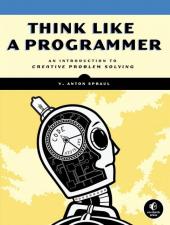"The author is obviously very knowledgeable and experienced with teaching hard concepts to new learners and this shows in his no-nonsense, down-to-earth but enjoyable writing style."
—Adrian Woodhead, Slashdot (Read More)
"Spraul has taught intro computer science classes for over fifteen years and it shows. He does a great job showing the theory using concrete examples, and rightfully puts a great deal of emphasis on programming exercises to strengthen the concepts."
—Ariane Coffin, Wired.com's GeekMom (Read More)
"The combination of conceptual overview and common problem-solving techniques that are applicable to many applications make this a particularly feasible way to supplement or review programming skills while learning a systematic approach to problem solving."
—Choice Magazine
"This is one of the most helpful books I've read, due to the fact that it guides you towards designing a system for yourself, as opposed to encouraging a mindset where there can be only one correct method."
—Lucas Westermann, Full Circle Magazine
"The book is well-written, with tons of excellent advice and solid, well-thought-out examples. If you’re willing to devote some time to studying the material, you’ll soon find yourself equipped with an impressive array of problem-solving strategies and, maybe, a new outlook on programming."
—Phil Bull, author of the official Ubuntu documentation (Read More)
"I guarantee if you work through the entire book you will stretch your brain."
—David Bolton, About.com C/C++/C# (Read More)
"I would definitely recommend this book as a companion to whatever text is used to introduce [new students] to programming and/or program logic."
—Joe Saur, The ACM's Software Engineering Notes Magazine
"[V. Anton Spraul's] advice is simple, straightforward, and practical. It's an easy—and valuable—read."
—James Powell, Enterprise Systems (Read More)
"I highly recommend Think Like a Programmer to anyone who wants to hone their creative problem-solving skills or to anyone who has learned to program, but doesn't feel that they fully understand the concepts."
—Robert Perkins, Game Vortex (Read More)
"This is definitely a book that I would use in teaching programming to others."
—Stephen Chapman, Ask Felgall (Read More)



